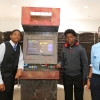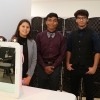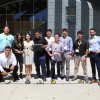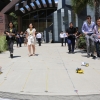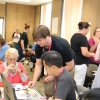Summer Outreach Programs Inspire Interest in STEM
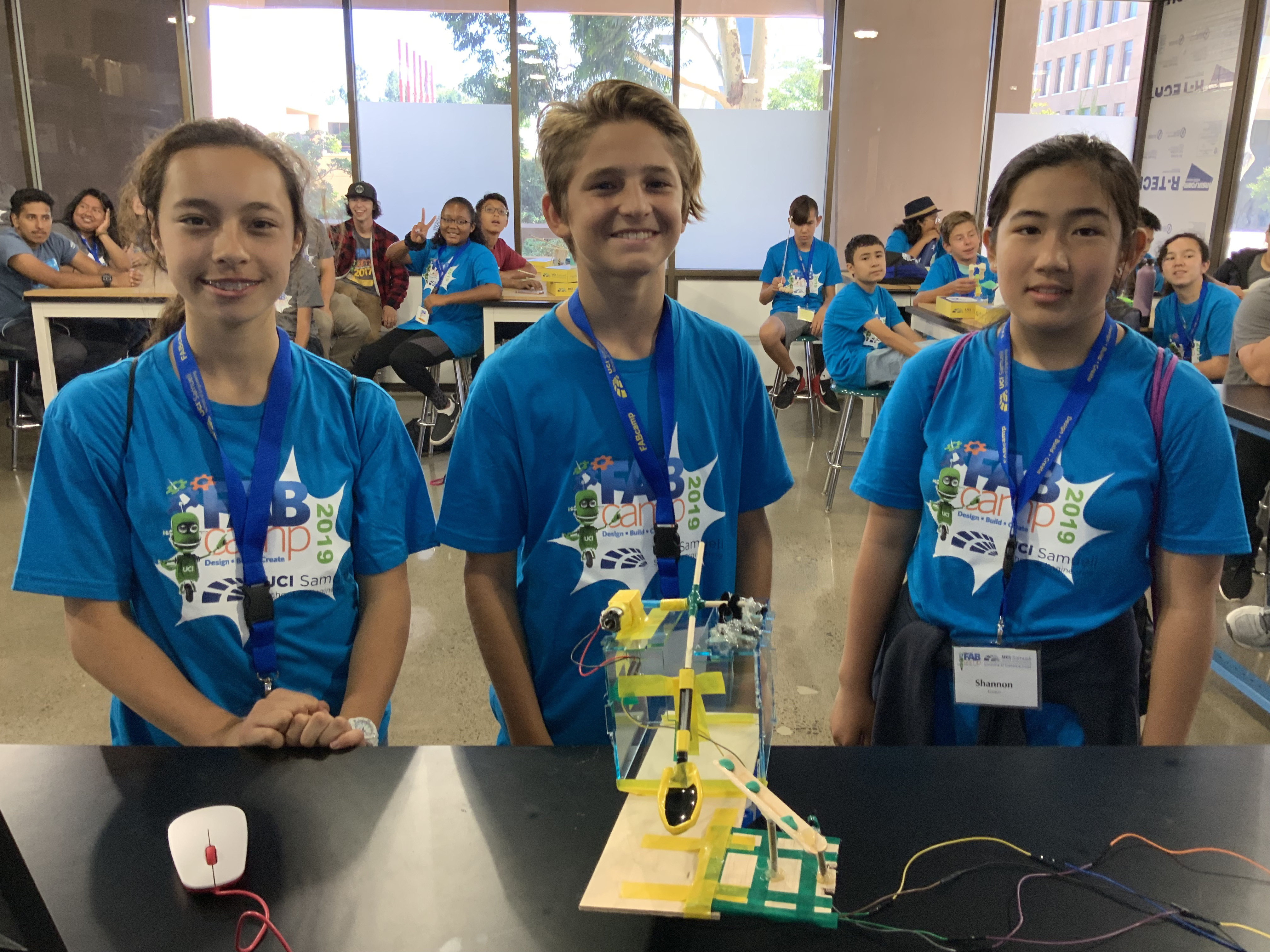
Oct. 2, 2019 - This summer was the biggest yet for outreach at the Samueli School of Engineering. With established programs growing and new programs launching, the school is taking its experiential learning approach to an increasing number of prospective and incoming students, many of whom are underrepresented in science fields. The school reached more than 300 students and more than 80 educators through a variety of offerings. Here is an overview, by participant age:
Middle Schoolers Love FABcamp
For the seventh consecutive summer, FABcamp offered middle school students (6th through 8th grades) the opportunity to learn about engineering disciplines as well as various fabrication and prototyping technologies in a fun-filled weeklong camp. With three levels of FABcamp over six weeks, the school had a record 165 participants. In three sessions of the 1.0 beginner camp, students engaged in hands-on projects that taught them all about the engineering disciplines offered at UCI. One such undertaking was a chemical engineering project in which campers used water, salt, a Q-tip and a 9V battery to etch their names onto metal nametags.
In two sessions of the intermediate 2.0 camp, students built a homemade, fabricated game of “Operation.” Campers designed and 3D printed their own game pieces and laser cut the game board using acrylic and cardboard. Additionally, they used Scratch (block-based code) to program custom sounds that played when the “grabber” came into contact with metal barriers.
In the 3.0 advanced camp, students took an in-depth look into the Raspberry Pi microcomputer by learning how to use a camera, control DC motors and sense the environment with a diverse set of hardware; then they learned Python (text-based code). Working in teams of two to three, they designed, fabricated and coded their own projects, showcasing them at the end of the week with their peers. Projects included a Pi-powered “Lint Roomba,” game controller fan and an automated catapult.
Marvin Maldonado, director of STEM Education and Pathways, said that it was the talented undergraduate summer staff who made a memorable impact on the campers. “We also relied on FABcamp alumni coming back as interns to provide a unique perspective and assist our counselors in a variety of roles,” said Maldonado. “And we were grateful, once again, for the assistance of the Broadcom Foundation, who provided scholarship support for 30 students from Santa Ana, Anaheim and Westminster to attend both our 1.0 and 2.0 camps over back-to-back weeks.”
OAI Takes Outreach to the Community
The Office of Access and Inclusion took its STEM outreach program into the community of Carson with the Bridges Summer STEAM Academy. Operated by a faith-based organization, Bridges Academy is a six-week intensive enrichment program for those entering 6th through 12th grades. The program includes early exposure to upcoming math concepts, an art class and the opportunity to build and fly drones as well as learn how to code. OAI partnered with the academy to run the drone and mobile app development courses.
“Participating in the Bridges Summer STEAM Academy was the first time we served a group off campus while simultaneously serving students at the university,” said Sharnnia Artis, assistant dean of Access and Inclusion. “The students of the program expressed interest in engineering and computer science after the program conclusion, so we consider it a success, and we plan to go again next summer.”
High Schoolers Learn to Microcompute
As part of a Center for Educational Partnerships program, 30 high school men of color participated in a one-day class at the school of engineering in which they learned about microcomputing using Raspberry Pi.
APSIRE and INSPIRE Encourage Pursuit of STEM Higher Education
Designed to ignite interest and expand the skills of students from low-resource communities so they can successfully pursue an education in STEM fields, these two programs are now in their fifth year at UCI. Fifty-nine high school students participated in one of three sessions of the ASPIRE program and 10 community college students attended INSPIRE.
During the two-week programs, participants learned microcomputing using Raspberry Pi, coding and CAD, as well as how to use 3D printers and laser cutters. The students worked in teams of two to create their own invention using Raspberry Pi. They presented their projects at a closing symposium.
In addition to this hands-on experience, students had the opportunity to see the UCI campus and hear from faculty, students and staff in the Samueli School of Engineering and the Donald Bren School of Information and Computer Sciences about planning for college and making decisions on majors best suited to them.
Undergraduate Student Initiative for Biomedical Research Enters Ninth Year
Started in 2011 by biomedical engineering Associate Professor Michelle Digman, the USIBR program exposes high school and community college students interested in science to quantitative biology and cutting-edge imaging technology at the Laboratory for Fluorescence Dynamics, a P41 NIH National Center. Students must apply to secure one of 20 spots for the free summer program, and priority is given to those who are underrepresented in STEM fields. This week of activity featured lectures given by biomedical engineering professors and postdoctoral fellows, and provided students with the opportunity to complete a mini research project that tested hypothesis-driven biological questions.
“These practicals are not cookie cutter hands-on sessions,” explained Digman, “but are intended to inspire critical thinking and test new hypotheses currently being investigated in our scientific research lab.”
Boot Camp Prepares Incoming Freshmen
Fourteen incoming freshmen came to campus this summer as OAI scholars for a two-week engineering boot camp. In addition to project-based curriculum similar to the INSPIRE program, the scholars spent mornings in class learning material from courses they will take their first year, such as calculus, chemistry, physics and coding (MATLAB/Python). This year, the OAI scholars had the opportunity to learn about rocketry. After a full day of academics, they spent the evenings building rockets. At the end of the first week, they went to the Lucerne Valley desert to launch their projects, becoming certified in level 1 rocketry.
S-STEM Summer Transition Program Launches
With funding from the NSF Scholarships in Science, Technology, Engineering and Mathematics (S-STEM) program, the UCI Pathways to Engineering collaborative project hosted its first summer transition program for 10 incoming transfer students. The program supports high-achieving, low-income students who are transferring to UCI from a community college.
During the one-week residential program, the S-STEM scholars gained hands-on, project-based experience creating a remote-controlled car that competed in a race at the end of the program.
The 10 students split into five groups of two to design and build their cars. The winning team − Pedro Hernandez from East Los Angeles College and Joshua Jones from Shasta College − named their car the Heartbreaker because it featured a wooden cutout heart on the front. Hernandez said they had many problems building their car, but in the end, their slow motor ended up providing them more control on the course. “It was a pretty awesome week,” he said. “We were exposed to a lot of things that will be helpful when we get here. “
Naeiri Shahmirzaeian from Glendale Community College and Sabrina Kalen from Orange Coast Community College came in second place. Both said they were happy to get to know the campus better and to meet other students. “I had no experience with circuit boards and such, so I feel a lot more prepared now,” said Kalem.
BASE 11 Summer Fellows Build Drones
Now in its fourth year, the BASE 11 summer fellowship program aims to help high-potential, low-resource students succeed in STEM. Five community college students spent seven weeks on campus designing and building unmanned autonomous systems, or drones. Through a partnership with the nonprofit BASE 11, students in this program received a stipend and lived on campus while working on their projects.
Training the Trainers
Four instructors from high schools in Philadelphia, Pennsylvania; Dallas, Texas; Cleveland, Ohio; and San Jose, California, spent one week at UCI learning how to incorporate data analytics into their curriculums. Sponsored by BASE 11, the program instructs engineering, math and science teachers on how to use experiential learning and data science so they can implement this popular hands-on approach with their students.
Raspberry Picademy Proves Popular with Educators
For the second time in the last three summers, UCI hosted the Raspberry Picademy. This two-day training, organized by the Raspberry Pi Foundation, travels to different venues each summer, teaching educators how to use Raspberry Pi microcomputers for computing and digital making across all age groups. The 80 educators (mostly from Southern California) who attended the professional development program included teachers, librarians, after-school and community educators and technology coaches. They learned physical computing with Scratch and Python, how to make things spin with motors, and how to code simple but fun graphical user interfaces, or GUIs.
Paula Golden, president of the Broadcom Foundation, was among the 43 participants who attended the first session. Golden’s work with the foundation involves inspiring youth to pursue careers in STEM. She said that although she has been involved in STEM outreach for many years, and helped to connect the Samueli School with Raspberry Pi cofounder Eben Upton, she realized that she didn’t know how to code herself. “Once I got some experience working with the unique charming little microcomputer, I was appropriately disarmed and allowed to just play!” said Golden. “At the Broadcom Foundation, we believe that computing and digital making is for everyone regardless of their background or prior experience.”
UCI will become an official Raspberry Pi Regional Training Partner in 2020. Some the academy attendees have close ties to the Samueli School’s K-12 and outreach initiatives (MESA, OC STEM, etc.) “We couldn’t be more excited about these opportunities to provide innovative professional development to formal and informal educators as well as continuing to give our summer camps a Raspberry Pi flavor,” said Maldonado.
– Lori Brandt

